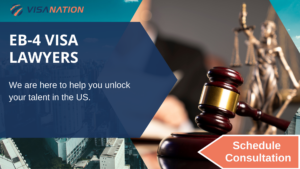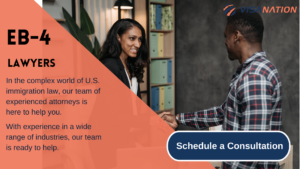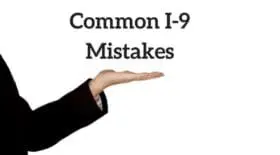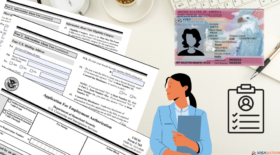The EB-4 immigrant visa is specified as an employment-based green card for special immigrant religious workers. It is generally intended for members of a non-profit religious denomination in the United States. However, the category can cover a broad range of applicants, including broadcasters, Iraqi and Afghan translators, members of the Armed Forces, and more.
The VisaNation team simplifies the entire process so you don’t have to worry about the small details. Schedule a consultation and unlock the full potential of hiring foreign workers for your business.
We make employment immigration to the U.S. easy and simple.
What is the EB-4 Visa For?
Employment visas are limited to 140,000 per year, and their allocation is split among five visas, resulting in long processing times. Of this 140,000 visa cap, 7.1% are allocated to EB-4 visas. After a year’s limit is reached, the rest of the applications wait for their turn in subsequent years.
The EB-4 visa is a type of employment-based visa that allows access to certain special immigrant groups. These categories include:
- Religious Workers: Individuals who are coming to the U.S. to work in a religious vocation or occupation, such as ministers, priests, or other religious workers.
- Special Immigrant Juveniles: Children who have been abused, abandoned, or neglected, and who cannot be reunited with their parents, and are therefore eligible for certain benefits under U.S. immigration law.
- Broadcasters: Individuals who work in the U.S. media industry, including radio and television broadcasters, who are coming to the U.S. to work in their field.
- Iraqis and Afghans who worked for the U.S. government: Individuals who have worked for the U.S. government in Iraq or Afghanistan as translators, interpreters, or in other capacities, and who are therefore eligible for special consideration for a visa.
- International employees of the U.S. government: Individuals who are employed by the U.S. government outside of the U.S., and who are coming to the U.S. to continue their employment.
- Other special immigrant categories: This includes a range of other categories, including retired NATO-6 employees, certain physicians, and others.

In order to qualify for immigration to the U.S., those applying for any employment-based visa must wait for their priority dates to become current.
Learn about: Family-based immigration
It’s never been easier to hire international workers
What Are The EB-4 Visa Requirements
The requirements differ for each EB-4 Visa applicant due to the number of eligible participants, but the general requirements include:
- The petition must be filed using Form I-360 with supplementary documentation
- The petitioner can file without an employer
Employers must also demonstrate that they have the financial stability to employ these workers. If they cannot do so, they will not be eligible to hire this foreign talent.
Form I-360 Explained
Form I-360, Petition for Amerasian, Widow(er), or Special Immigrant is a form used to initiate the EB-4 visa application process. In the context of EB-4, the I-360 is designed for special immigrants.
Due to the multi-application of the form, you will not have to fill out every section of it. For example, if you are applying as a religious worker, then you would leave several other sections, like the one for broadcasters, empty.
Unlock the power of hiring foreign workers
How Long Does it Take to Process an EB4 Visa?
The EB4 processing times involve:
I-360 processing time
A significant portion of the EB-4 visa waiting time consists of the processing time for Form I-360, which takes 3.7 months according to USCIS data. This time can vary, however, depending on the processing center and its workload.
You must take into account the time that it will take you to gather all of the relevant evidence.
Different categories of EB-4 visa applicants may require other documents. It is crucial to consult a knowledgeable immigration attorney.
Waiting for Your Priority Date to Become Current
The waiting time varies for this stage, as you must wait until your priority date becomes current with the final action date listed in the visa bulletin. As of May 2025, the Employment-Based Fourth Preference (EB-4) category is marked as “Unavailable” (U) in the Visa Bulletin for all countries.
This designation indicates that the annual limit for EB-4 visas has been reached for Fiscal Year (FY) 2025, and no further visas will be issued in this category until the start of the next fiscal year, October 1st, 2025
I-485 or Consular Processing
Once the EB-4 petition (Form I-360) is approved and the priority date is current, applicants in the U.S. can file Form I-485 for Adjustment of Status, which takes approximately 7 months to process.
Those outside the U.S. will proceed through consular processing, which typically takes around 6 months from National Visa Center (NVC) case creation to visa issuance.
Both paths ultimately lead to permanent resident status, with processing timelines dependent on visa availability and applicant location.
Learn about USCIS processing times
How to Apply for the EB-4 Visa
The application process, although similar because all EB-4 applicants must submit the I-360, is also considerably different depending on your category.
Generally, all applicants will have to:
- Show proof of employment that is relevant to their EB-4 category;
- Might have to meet certain employment timeframes (ex. be employed at least for 2 years with the organization);
- Submit relevant evidence that once again will be highly specific to your EB-4 category.
- Undergo a workplace inspection by USCIS, depending on your EB-4 category and supporting evidence.
The EB-4 visa is highly complex due to its all-encompassing nature. While some applicants are subject to one requirement, other applicants will have completely different requirements. On many occasions, the process may even differ on a case-by-case basis within the same EB-4 category.
EB-4 Religious Worker Requirements
For applicants filing under the EB-4 religious worker category, be aware of the strict eligibility requirements:
- Must have been a worker for the religious denomination for a minimum of two years.
The applicant is required to be entering the United States as:
- A priest or minister of a religious denomination
- A professional or nonprofessional religious occupation. This also includes religious vocation, which is a calling/devotion to a religious lifestyle. The applicant must have taken vows and devoted him/herself to a specific religious tradition.
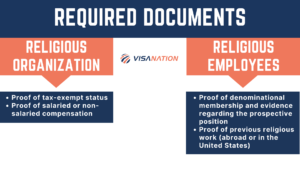
EB-4 Religious Worker Application Procedure
- The employer is required to submit Form I-360 to the USCIS.
- A PERM is not required for the EB-4 religious workers, however, the applicant must provide evidence of the religious organization.
- The applicant is required to submit proof that the religious organization is a non-profit organization.
- The applicant is obligated to obtain a letter from a superior within the religious organization in the United States.
EB-4 Religious Worker Letter
On many occasions, foreigners who are applying for the EB-4 visa under the religious worker category will require a worker letter. Below is more detailed information about it:
- The letter must provide evidence that the applicant has been a member of the organization for a minimum of two years. It should also demonstrate that you have had at least two years of religious occupation/ vocation experience.
- If the applicant is a minister, the letter is obligated to provide proof of authorization and the duties entailed with the occupation.
- If the applicant is a religious professional, he/she must have a bachelor’s degree for the EB-4 religious worker occupation. The professional must also have a letter stating the applicant’s U.S. bachelor’s degree or its foreign equivalent. It is mandatory to submit an official transcript or academic record.
- If the applicant is seeking religious employment in the United States, the letter is obligated to provide proof of the applicant’s qualifications for the religious occupation/vocation.
- If the applicant intends to work with a religious organization in the United States but as a non-professional or non-ministerial, the letter is meant to demonstrate how the organization is associated with the religious denomination.
- The applicant’s letter must explain at length, the duties of the minister or the wages the applicant is expected to receive while working as a professional or other religious occupation. The letter should explain that the applicant will not rely on a secondary occupation or charity for financial support.
Sample EB-4 Religious Worker Letter
Dear [Name of USCIS Officer],
I am writing to support the EB-4 visa application of [Name of Religious Worker], who is a member of our religious community and has been serving as a [Position Held] at our [Name of Religious Organization] for [Number of Years].
[Name of Religious Worker] has been an integral part of our community, providing spiritual guidance and support to our members. His/Her duties include leading religious services, providing pastoral care, and organizing community events. His/Her commitment to our organization and the wider community has been invaluable, and we believe he/she is deserving of permanent residence in the United States.
As a religious worker, [Name of Religious Worker] has demonstrated exceptional abilities in his/her field. He/She has completed the necessary education and training required to perform his/her duties and has extensive experience in religious activities. [Name of Religious Worker] is also known for his/her kindness, compassion, and willingness to go above and beyond to assist those in need.
We believe that [Name of Religious Worker]’s continued presence in the United States would greatly benefit our community, as well as the country as a whole. His/Her contributions have been recognized by our members, and we would be honored to have him/her remain as a permanent member of our community.
Thank you for your attention to this matter. Please do not hesitate to contact me if you require further information or clarification.
Sincerely,
[Name and Title of Religious Organization Leader]
Read more: H-1B visa for foreigners.
EB-4 Priority Dates
One thing to account for when determining the EB-4 processing time is the concept of priority dates. Your priority date is the day that the USCIS receives your EB-4 petition. You will need to compare this date to the “final action dates” given in the visa bulletin released by the Department of State each month.
When your priority date meets the EB-4 final action date for your country, your date will become “current”, meaning that an immigrant visa number is available and you can move on to the next step.
Keep in mind that these priority dates are not the same for everyone. Because there is an annual limit on each visa, that number is spread across several countries. If too many people from one country apply for the same green card, a backlog develops. This is why applicants from heavily populated countries such as China and India tend to have longer priority date waiting times than others.
Occasionally, they also become unavailable when
Adjustment of Status vs. Consular Processing
The final step in the EB-4 process, once your priority date is current, is to obtain your permanent resident status. This is done in one of two ways:
Consular Processing – This involves traveling to a designated U.S. Consulate or Embassy in your home country and taking part in an interview with a consular officer.
If the officer approves you, then the immigrant visa will be added to your passport, and you will be able to enter the U.S. as a legal permanent resident. If you are currently outside the U.S. and not under any nonimmigrant status, this is the only option.
Adjustment of Status – This option is available to those who are already in the U.S. under a nonimmigrant status. It involves filing an I-485 application to adjust status with the U.S. to have your nonimmigrant status adjusted to immigrant status.
This process usually takes around 7 months and costs $1440.
Those who are eligible will likely want to take these factors into account when deciding between adjustment of status and consular processing.
We make employment immigration to the U.S. easy and simple.
How to Change R-1 visa to a Green Card?
You will need to file an I-360 petition like all other applicants and wait for your priority date to be current with the final action date in the visa bulletin before attending your consular interview or adjusting your status.
It is a common misconception that having an R-1 visa is a direct path to the EB-4 green card. However, while the R-1 and EB-4 Green Card share many requirements, making you a likely candidate for the green card, it does not guarantee approval or streamline the process.
Our Experience with EB-4 Immigrant Visa
Our lawyers have extensive experience with obtaining EB-4 visas for Religious Workers and Special Immigrants. We pride ourselves on outstanding service and exceptional client care. This is what our leading business immigration lawyer, Shilpa Malik, said about our EB-4 services:
As an attorney, I have witnessed the transformative power of the EB-4 visa for religious workers firsthand. It serves as a beacon of hope, enabling individuals with unwavering faith and a genuine calling to serve their religious communities in the United States. T
he EB-4 visa not only provides a legal pathway for these dedicated individuals but also fosters cultural diversity, enriching the tapestry of American society. It is an honor to guide and support religious workers in their pursuit of the EB-4 visa, allowing them to embark on a meaningful journey of spiritual service and contribute to the fabric of our great nation.
Alternatives to EB-4 Green Card
There are a number of alternatives to the EB-4 if you do not meet the qualifications. Here are some of them below:
- EB-1 Green Card: This category is for individuals with extraordinary ability in sciences, arts, education, business, or athletics. It is also applicable to outstanding professors or researchers, or managers and executives of multinational companies. In order to qualify for the EB-1A you must be able to provide evidence of extraordinary ability, be reputable in your field and have documented confirmation of the applicant’s achievements, continue to work in the recognized field and have obtained national or international acclaim.
- EB-2 Green Card: This category is for individuals with exceptional ability in sciences, arts, or business, or those with advanced degrees. It also includes National Interest Waiver petitions for those whose work is deemed to be in the national interest of the United States. The overall EB-2 visa processing time can range from 10 months – 2 years, depending on how long your I-140 takes to process and then when a visa becomes available.
- EB-3 Green Card: This category is for skilled workers, professionals, and other workers with less than two years of experience. It also includes workers with a bachelor’s degree or the equivalent, as well as unskilled workers.
- EB-5 Green Card: This category is for individuals who invest a certain amount of money in a new commercial enterprise that creates or preserves at least 10 full-time jobs for U.S. workers.
- H-1B Visa: This visa category is for foreign workers in specialty occupations, including but not limited to, scientists, engineers, programmers, and accountants.
- L-1 Visa: This visa category is for intracompany transferees who are managers, executives, or have specialized knowledge and are being transferred from a foreign company to its U.S. affiliate.
- O-1 Visa: This visa category is for individuals with extraordinary ability in sciences, arts, education, business, or athletics, or those with demonstrated extraordinary achievement in the motion picture or television industry.
- TN Visa: This visa category is for Canadian and Mexican citizens who are qualified professionals and are seeking temporary entry into the United States to engage in business activities under the North American Free Trade Agreement (NAFTA).
The choice of which alternative to pursue depends on an individual’s specific qualifications, education, work experience, and intended purpose for immigrating to the United States. It is strongly advised to consult with an immigration attorney to determine the best alternative to the EB-4 Green Card.
Frequently Asked Questions
Below you will find answers to the most commonly asked questions about the topic.
Q. What qualifications must one have to be considered a minister/member of the clergy?
To be considered a minister or member of the clergy, U.S. law states that the person must be recognized by a religious denomination to perform certain religious ceremonies or activities. Examples include priests, Buddhist monks, commissioned officers of the Salvation Army, deacons, rabbis, etc. It’s important to mention that there are limitations on who can consider themselves a minister. They must have some sort of certification of ordination, license, or other documentation from a formal institution.
Q. What is a religious denomination?
A religious denomination is a community or group of religious beliefs that have some formal structure, including a doctrine, form of worship, specific ceremonies, and established worship locations.
Q. What are some advantages of EB4?
One big advantage is that the process is quite speedy. You can obtain a visa/ change of status immediately after the petition is approved. No test of the job market is necessary in this case. The entire process could take only a few months.
Q. Can I Use Premium Processing?
While premium processing, the optional feature that allows petitioners to shorten the usual processing time for their petitions to 15 calendar days, can be incredibly helpful for some, it is unfortunately not available to EB-4 applicants. This is due to the fact that premium processing is only available to visas and green cards that make use of either the I-129 or the I-140 petition forms. Because the EB-4 uses the I-360, it is not eligible.
Q. Can My Family Accompany Me?
Your family can accompany you, but only after your EB-4 green card has been approved. These family members must be a part of your immediate family, meaning that they must either be a spouse or an unmarried child under the age of 21. In order to join you, each family member must choose one of three options:
- Adjustment of status – this is appropriate if they are already in the U.S. under a nonimmigrant visa status (such as the R-1)
- Consular processing – involving going to a U.S. consulate or embassy in your home country
- Concurrent filing – there are certain situations in which a family member may be able to join you after you have already arrived in the U.S. as a permanent resident.
EB4 Visa Summary
To recap, there are two groups of foreign nationals within the EB-4 category. The first is religious workers (commonly ministers) and the second is employees and former workers of the U.S. Government overseas (foreign nationals).
The process is relatively fast since you can obtain a visa/ change of status immediately after the petition is approved, and there are no job market tests that must be completed in advance.
Review the aforementioned list of documents necessary and consult an immigration attorney for more specific details.
How VisaNation Law Group Immigration Lawyers Can Help
VisaNation Law Group immigration lawyers have successfully handled cases regarding EB-4 Religious Workers and other applicants eligible under the EB-4 Visa category. The VisaNation Law Group Miami lawyers are experts at delivering quality service and filings to properly complete forms and supplementary documentation. What’s more, the immigration lawyers are capable of assisting clients with the I-360 petition for Amerasian, Widow, or Special Immigrant and the EB-4 Religious Worker letter. Get started today!
